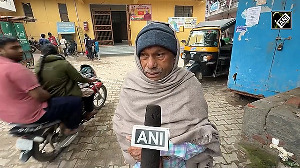As India moves towards unlocking various sectors, COVID-19 cases have been rising exponentially with a jump of nearly 61,000 cases in the past one week, and medical experts feel that if the situation spirals out of control, the lockdown may have to be reimposed.

India saw a record single-day jump of 9,851 coronavirus cases and 273 deaths on Friday, pushing the nationwide infection tally to 2,26,770 and the death toll to 6,348, according to the Union health ministry.
There has been a record spike in cases for three consecutive days now.
Most countries like Spain, Germany, Italy and the United Kingdom, lifted their respective lockdowns and curbs when their COVID-19 graphs either flattened or dipped, according to statistics shared on Twitter by Congress leader Rahul Gandhi.
India's COVID-19 curve has been steadily rising throughout the lockdown period with a massive spike in cases in the fourth phase of the lockdown that ended on May 31 and afterwards.
The fourth phase of the coronavirus-triggered lockdown, which began on May 18, saw 85,974 COVID-19 cases till 8 am on Sunday, according to health ministry data.
The lockdown 1, which was first clamped on March 25 and spanned for 21 days, had registered 10,877 cases, while the second phase of the curbs that began on April 15 and stretched?for 19 days till May 3, saw 31,094 cases.
The third phase of the lockdown that was in effect for 14 days ending on May 17, recorded 53,636 cases till 8 am of May 18.

Last Friday, the number of COVID-19 cases stood at 1,65,799, while a week before that on May 22, there were 1,18,447 cases. Therefore, the spike in the last one week has been of 60,971 cases, while the increase in the number of infections in the week before that was 47,352.
At present, India is the world's seventh-worst hit nation in terms of overall case count, after the US, Brazil, Russia, the UK, Spain and Italy.
"Whenever lockdown is opened in phases, there will be a spurt in cases. A lockdown basically is used to prepare for the pandemic and halt the spread," said Dr Vikas Maurya, Director and Head, Department of Pulmonology and Sleep Disorders, Fortis Hospital, Shalimar Bagh.
"Increase in cases will be there when unlocking is done in phases, but what is important is to be mindful that the situation should not spiral out of control, as if it does, then lockdown will have to be re-imposed," Maurya said.
Noted lung surgeon Dr Arvind Kumar said that it was important to ensure that people continue to have a "self-imposed" lockdown and follow the "four golden principles" -- don't go out unless necessary, always wear a mask, keep distance and keep washing hands.
"Right now the situation does not warrant a reimposition of the lockdown, but if the situation spirals out of control, then we would have to go back to a lockdown," he said.

Kumar, who works at the Sir Ganga Ram Hospital, also asserted that it was too early to allow religious places and malls to open as there are not enough checks to ensure that people will not flout norms.
Dr Vivek Nangia, Director and Head Pulmonology, Fortis Hospital, Vasant Kunj, also said that the rapid rise in cases was worrying.
It is still early to open malls and religious places as if congregations start to happen, then things could spiral out of control, he said.
The Union health ministry on Thursday issued standard operating procedures to be followed by religious places, shopping malls, restaurants, hotels and offices to contain the spread of COVID-19 as India gears up to reopen the economy.
The preparations for reopening the economy, which has been severely hit by the coronavirus-triggered lockdown, from June 8 comes amid mounting cases and death toll in the country.

The nationwide curbs were first announced by Prime Minister Narendra Modi on March 24 for 21 days in a bid to contain the spread of the novel coronavirus.
The lockdown was first extended till May 3 and then again till May 17. It was further extended till May 31 and now has been extended in containment zones till June 30.
The number of active COVID-19 cases in the country stands at 1,10,960 while 1,09,461 people have recovered and one patient has migrated, it said. Thus, around 48.27 per cent patients have recovered so far.
The first case of COVID-19 in India was reported on January 30 from Kerala after a medical student of Wuhan university, who had returned to India, tested positive for the virus.











 © 2024 Rediff.com -
© 2024 Rediff.com -